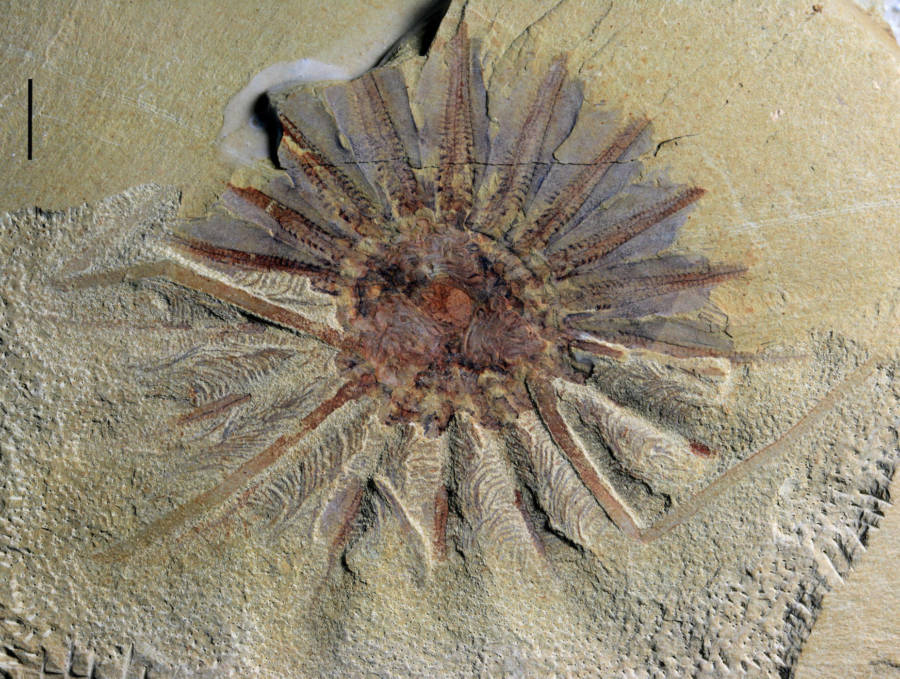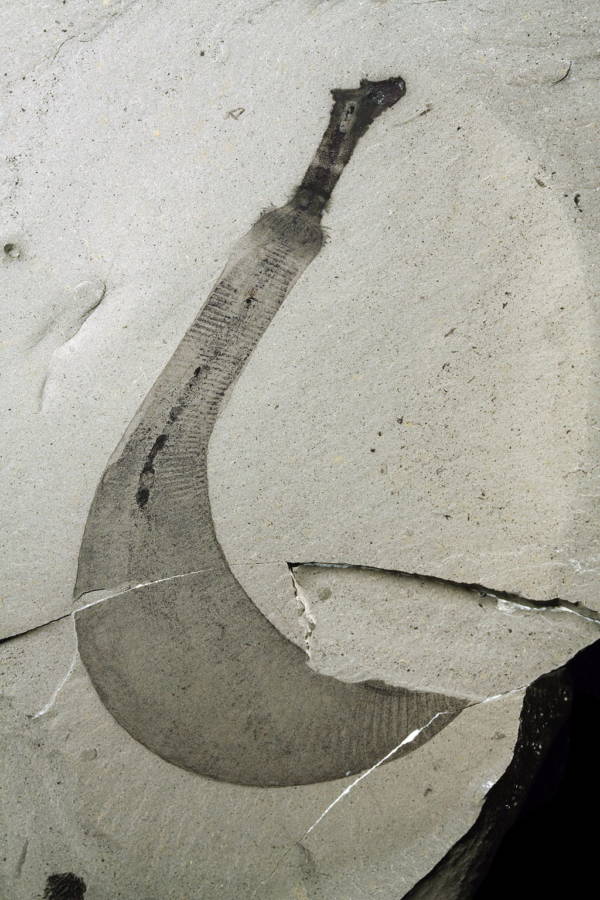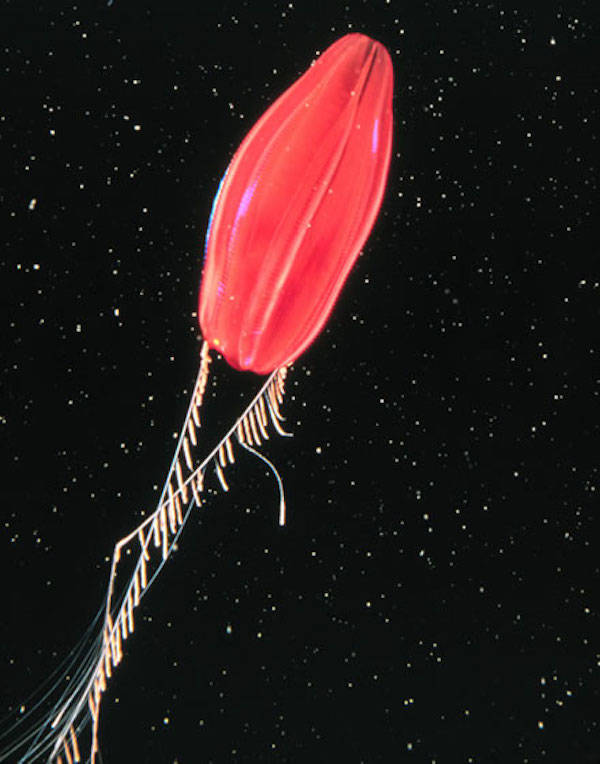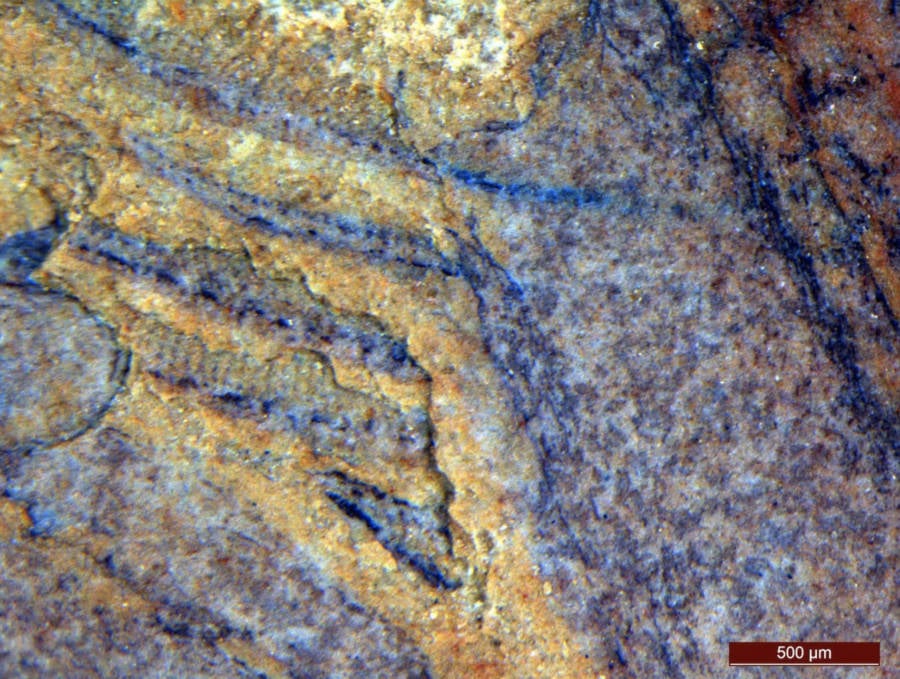One such creature among those fossils discovered had 18 tentacles for a mouth.

Yang ZhaoThe 518-million-year-old Daihua fossil discovered in China.
A University of Bristol research team recently discovered a series of startling fossils in China. The recent discovery of these fossils has shed new light on dozens of species, many of them previously a mystery to the scientific community.
Among these finds was a 518-million-year-old fossilized sea creature with 18 tentacles near its mouth. Dubbed the Daihua sanqiong, the animal shared numerous anatomical features with the modern comb jelly, suggesting that it might be a distant relative.
According to LiveScience, paleobiologist and lead researcher Jakob Vinther,”to make a long story short, we were able to reconstruct the whole lineage of comb jellies from the anatomical comparisons between fossils and contemporary specimen.” Since comb jellies are thought to be among the first beings ever to evolve on Earth, the fact that this fossil predates them is huge news.
Vinther is thus confident that this discovery will shed substantial light on the bizarre comb jellies, recently found to have a moving anus, and named thusly due to the combed rows of cilia they use to traverse the oceans. “With fossils, we have been able to find out what the bizarre comb jellies originated from,” said Vinther. “Even though we now can show they came from a very sensible place, it doesn’t make them any less weird.”
Comb jellies are thought to be among the very first animals to evolve, according to the University of Bristol. The team of scientists — which includes researchers from China’s Yunnan University and London’s Natural History Museum — compared this fossil with those of similar skeletal structures and established that they all evolved from the same ancestor.

Wikimedia CommonsAn Aulacoctena comb jelly.
The fossil was uncovered in mudstone south of Kunming in the Yunnan Province in southern China by co-author of the study, Professor Hou Xianguang. This isn’t the first biological discovery found in this particular region, either, as numerous well-preserved fossils have been uncovered here in the last 30 years.
It was named the Daihua sanqiong after the Dai tribe in Yunnan and “hua” which means “flower” in Mandarin and relates to the fossil’s flower-like shape. The animal’s 18 tentacles are all fine and feather-like, with rows of large cilia adorning the exterior.
“When I first saw the fossil, I immediately noticed some features I had seen in comb jellies,” said Vinther. “You could see these repeated dark stains along each tentacle that resembles how comb jelly combs fossilize. The fossil also preserves rows of cilia, which can be seen because they are huge.”
The scientific record made it immediately apparent that this cilia-laden animal was related to its modern counterpart. “Across the Tree of Life, such large ciliary structures are only found in comb jellies,” he said.

Wikimedia CommonsFossil of the Ottoia Tricuspida fossil, a soft-bodied worm, abundant in Canada’s Burgess Shale.
Besides the glaring significance of discovering a well-preserved fossil older than half a billion years, the Daihua also shed some notable light on a famous fossil found in the Burgess Shale deposit of Canada in 1909. There, a 508-million-year-old fossil known as Dinomischus — which also had 18 tentacles — had been found to be the most scientifically exciting find of this kind — until now.
“What makes the Qinjaing special compared to other Cambrian sites with soft parts preserved, such as the Burgess Shale and Chengjiang Biota, is the fact that there is over 50 percent entirely new taxa of animals and algae that are previously unknown to science,” said University of Lausanne paleontologist Allison Daley.
Daley added that the 518-million-year-old fossil discovery is of “truly exceptional quality” because of its preservation of the animal’s anatomy without the expected distortions that usually occur during fossilization. “It shows how we have these little windows back to the past and how finding another site can change what we know,” said Vinther.

Wikimedia CommonsA comb jelly named “Tortugas red,” with the iridescence and cilia immediately apparent.
Modern-day comb jellies essentially use these cilia to swim, with the hairs illuminating in iridescent colors as they navigate the deep. The fossil’s striking resemblance to the previously discovered Dinomischus has allowed Vinther and his team to elucidate a lot about the species’ past.
Some of the study’s conclusions have already garnered new understanding of how comb jellies evolved. For instance, the ancestors of the comb jellies seemed to have had skeletons on their tentacles, which allowed them to transition to the combs of cilia found on comb jellies of today.
Additionally, researchers were previously convinced that the sea creature Xianguangia was a sea anemone, but now believe that it “is actually part of the comb jelly branch,” according to study co-researcher Peiyun Cong, a professor of paleobiology at Yunnan University.
These fossil findings also strongly suggest that comb jellies and corals, sea anemones, and jellyfish are all related. “These tentacles are the same tentacles that you see on corals and sea anemones,” said Vinther. “We can trace comb jellies to these flower-like animals that lived more than half a billion years ago.”

Jakob VintherA magnified image of the Daihua fossil, with the rows of cilia plainly visible.
Not everyone in the scientific community has agreed with these conclusions, however. Yale University professor of ecology and evolutionary biology, Casey Dunn, has led the charge against the kind of extrapolations described above.
“I am highly skeptical of the conclusions they draw,” said Dunn, who explained that the vast differences in body shapes make it difficult to see how some of the creatures could be related. Nonetheless, Dunn is generally pleased and enthusiastic about the discovery — as any curious scientist in the field would be.
“These are exciting animals no matter how they’re related to each other. Even though I’m skeptical that tentacles and comb rows are homologous (evolutionarily related), I think that as we describe more diversity from these deposits, certainly we’re going to learn a lot more about animal evolution.”
Next up, read about the very first animal on Earth. Then, learn about the discovery which suggested humans’ earliest ancestor was a tiny, anus-less mouth.





